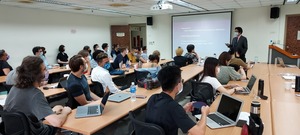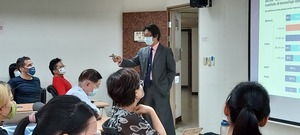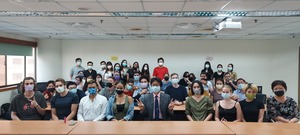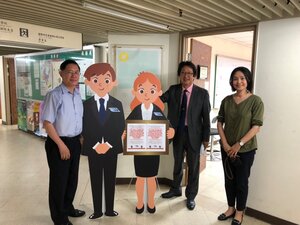Date :
2021-05-19
Department :
International Master's Program in International Studies
【Article by IMPIS】
International Master's Program in International Studies (IMPIS) invited senior media person Ling Xiang Wu to give a speech on May 13, 2021. Mr. Wu has a bachelor's degree in electrical engineering from National Taiwan University and a master's degree in electrical engineering from University of Michigan in the United States. He is currently a PhD candidate in the Department of Political Science of National Taiwan University, and has served as an industry financial advisor for a long time. The topic of the lecture was "US-China Technology and Semiconductor Competition: The Role of Taiwan and the Link between Theories of International Political and Economic Relations,” sharing brilliant insights from the perspective of science and technology with students at the political economy course.
Dr. Wu started the topic with an interesting question, "Assume that China is going to invade Taiwan, would it be safer to hide in the TSMC(Taiwan Semiconductor Manufacturing Co., Ltd.) fab to avoid the missile attack?" In the meantime, Dr. Wu took out a wafer board and let students take a look of it. He then talked about the relationships between power transition theory and international political economy.
The power transition theory was first proposed by Organski in 1958. The main idea is to divide countries into dominant, great, middle and small states according to their strength through the hierarchical system on international ground. Dr. Wu pointed out that the hegemonic state is satisfied with the current situation because of its role as the defender of international regime and the existing system. Meanwhile, other great power may feel dissatisfied and intend to challenge the hegemony. Dr. Wu believes that when the strength of revisionist power gradually catches up with the hegemony, preemptive wars will inevitably occur between the dominant power and the revisionist power. This is also the reason why the United States – the dominant power- took the initiative to start Tech War against China.
Regarding Taiwan’s role in US-China Tech War, Dr. Wu said that since TSMC maintained great performances in the world’s semiconductor supply chain, Taiwan’s role in US-China Tech War has become rather important. According to data research, Integrated Circuits (ICs) manufactured by Taiwan rank second in the world, while the United States and China rank the first place and the third place respectively. Currently, ICs manufactured by Taiwan account for nearly 20% of the world, and has grown year by year since 2018.
When it comes to the issue of how US-China Tech War will end, Dr. Wu asked the students to think about the meaning of "Tech War." As its name implies, tech means science and technology. The development of science and technology is led by advanced scientific research, and technological research and development are also closely related to scientific research. Therefore, if we examine the development of scientific research in all countries, it won’t be hard to find out that the United States is still dominant one. In terms of the 2020 Nobel Prize in physics, chemistry, physiology and medicine science, there are about 260 winners from the United States, while only 9 winners from China.
At the end of the speech, Dr. Wu concluded that the United States will still be ahead of China in the field of science and technology for some time. Even though China's technology industry has grown rapidly in recent years, the quality in general is still lagging behind the United States. It seems that US-China Tech War will last for a while in the future.





